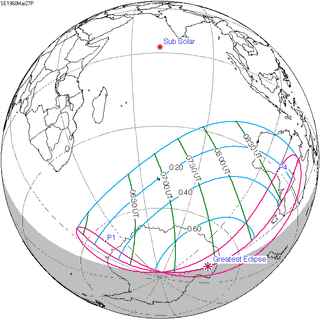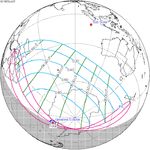Solar eclipse of March 27, 1960
| Solar eclipse of March 27, 1960 | |
|---|---|
 Map | |
| Type of eclipse | |
| Nature | Partial |
| Gamma | -1.1537 |
| Magnitude | 0.7058 |
| Maximum eclipse | |
| Coordinates | 72°06′S 151°54′E / 72.1°S 151.9°E |
| Times (UTC) | |
| Greatest eclipse | 7:25:07 |
| References | |
| Saros | 148 (18 of 75) |
| Catalog # (SE5000) | 9420 |
A partial solar eclipse observable from parts of Antarctic Ocean and Indian Ocean occurred on March 27, 1960. A solar eclipse occurs when the Moon passes between Earth and the Sun, thereby totally or partly obscuring the image of the Sun for a viewer on Earth. A partial solar eclipse occurs in the polar regions of the Earth when the center of the Moon's shadow misses the Earth.
Related eclipses[]
Solar eclipses of 1957–1960[]
This eclipse is a member of a semester series. An eclipse in a semester series of solar eclipses repeats approximately every 177 days and 4 hours (a semester) at alternating nodes of the Moon's orbit.[1]
| Solar eclipse series sets from 1957–1960 | ||||
|---|---|---|---|---|
| Descending node | Ascending node | |||
| Saros | Map | Saros | Map | |
| 118 |  1957 April 30 Annular (non-central) |
123 |  1957 October 23 Total (non-central) | |
| 128 |  1958 April 19 Annular |
133 |  1958 October 12 Total | |
| 138 |  1959 April 8 Annular |
143 |  1959 October 2 Total | |
| 148 |  1960 March 27 Partial |
153 |  1960 September 20 Partial | |
References[]
- ^ van Gent, R.H. "Solar- and Lunar-Eclipse Predictions from Antiquity to the Present". A Catalogue of Eclipse Cycles. Utrecht University. Retrieved 6 October 2018.
External links[]
Categories:
- Partial solar eclipses
- 1960 in science
- 20th-century solar eclipses
- March 1960 events
- Solar eclipse stubs



